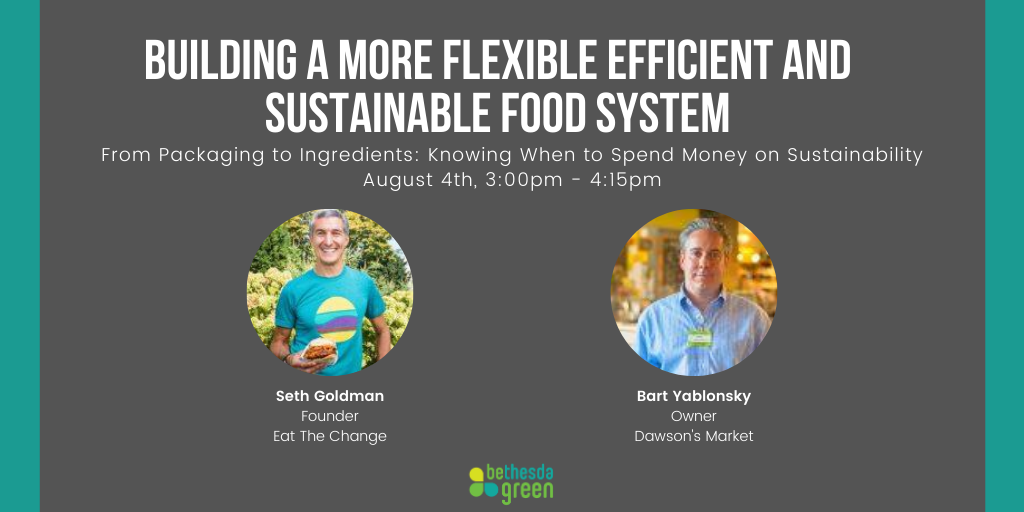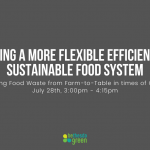Bethesda Green recently kicked off its Summer 2020 Speaker Series: Tackling Environmental Challenges Through Sustainable Entrepreneurship. This series aims to educate and inspire prospective entrepreneurs by highlighting gaps in the market, and challenging them to address those gaps with innovative and sustainable for-profit business solutions. During this series, 18 speakers, including founders, industry experts, and policy makers, are coming together to discuss two primary topics: 1) Building a More Flexible, Efficient, and Sustainable Food System and 2) Establishing a Circular Economy.
The following details the key takeaways from the second session.
Session #2: From Packaging to Ingredients: Knowing When to Spend Money on Sustainability
Watch the full session on YouTube here: https://youtu.be/t42me00UCkM
Speakers included Seth Goldman, a serial entrepreneur with decades of experience in launching socially responsible organizations such as Honest Tea, Eat the Change and PLNT Burger, and Bart Yablonsky, who is the owner of Dawson’s Market, a locally focused, independent, natural foods market in Rockville, MD.

Both panelists tapped into their extensive experience as founders to share lessons learned with entrepreneurs who seek to launch a sustainable product. Below are three key takeaways from the session:
Consider Your Impact and Connect With Customers
For any entrepreneur, the first steps of creating a sustainable product are to consider the intended impact and the target consumers. In launching Honest Tea, Goldman set out to make an impact on the high calorie American diet and on the pesticide dependent agriculture industry by providing a low-sugar, tasty alternative to the soft drinks that had flooded the market. Yet he knew from the beginning that it doesn’t matter how big of an impact he wanted to make if customers didn’t like his product. Goldman remarked, “I start with the cause then I go right to the consumer.” His years of experience in the food industry have taught him that resonating with customers is absolutely crucial and requires significant trial and error.
Yablonsky echoed this sentiment and said the key to success is having a compelling product and that starts with flavor: does the product taste good? Once a founder has identified a great tasting product, he said their next goal should be to identify a specific customer niche, build their story around their recipe, or develop packaging that sets their products apart from others. There’s so much competition in the food industry that it’s important to get any edge you can on competing products and make your product stand out. Creating ways to stand out can be expensive, especially for founders who choose to use environmentally responsible packaging to do so. Organic ingredients, which have historically been at a premium, are increasingly price competitive with traditional farming products. Yoblansky spoke to his experience with Dawson’s Market and has found that even though costs are higher for a sustainable product, most consumers are very willing to pay a 10-15% premium for a higher quality product.
As an aside for prospective entrepreneurs, Yablonsky also mentioned that if he were to make a food product, he would develop something that’s shelf stable. He said that in terms of real estate within grocery stores, there’s more shelf space than space in the frozen/refrigerated sections, so it’s less challenging to get your foot in the door with a shelf-stable product.
Be as Transparent as Possible
Goldman believes that the key to building a brand is being trustworthy. He finds that buzzwords in marketing campaigns like “all-natural,” “healthy,” and “sustainable” are too generic and are open to a wide range of interpretations, which can have an impact on whether consumers feel the brand is telling the truth. When conveying brand messaging, he feels that it’s important to use a standard set of definitions because clarity builds trust with customers.
For example, with Honest Tea, rather than claiming that they were environmentally friendly, he got a federally enforced third-party to verify that there were no pesticides used in the growing process. Instead of just saying Honest Tea was socially conscious, he worked with Fair Trade USA to make sure that there was a paper trail all the way back to the tea gardens to ensure that farmers were being paid a living wage. With Beyond Meat, rather than paying a consultant to tell them what they wanted to hear, they commissioned a third-party, peer-reviewed lifecycle analysis from the University of Michigan, which found that Beyond Meat burgers use 99% less water and 93% less land than beef burgers.
Goldman is a big believer in third-party certifications, and feels that even in the early stages of a company, third-party verification can be crucial in establishing credibility with your customers. When asked about what initial certifications can be useful for early stage entrepreneurs with budgetary constraints, he talked about how organic certification is a great place to start. If a farm has organic certification, entrepreneurs can reach out to the organic certifier and verify the accuracy of the farm’s claims. In a way, this delegates most of the due diligence onto the farm, and once the entrepreneur verifies that the farm is certified organic, they can market their product as using certified organic ingredients.
Be Nimble
Both Yablonsky and Goldman emphasized that one core competency of any successful entrepreneur is adaptability. Since it’s vital for customers to understand a brand’s messaging, founders must be willing to make changes quickly to respond to customer demands and gain their trust. Sharing one example, Goldman talked about how one customer had read Honest Tea’s original slogan of “Fresh Brewed and Barely Sweetened” and said, “Barley sweetened! I’ve never had that before!” He realized he had to change the slogan to avoid confusion and deliver his desired message. In another example of adaptability, Yablonsky noted how when the pandemic hit, alcoholic beverage producers who were dynamic were able to capitalize on the lack of hand sanitizer and fulfill that need. In both cases, being able to adapt was a key to success for those businesses.
Ultimately, no entrepreneur can produce the perfect product their first time around, and having a continuous innovation mindset is important for success. At Dawson’s Market, Yoblansky works with a lot of up-and-coming food businesses, and has seen a lot of products that have faulty packaging or aren’t shelf-stable. He believes testing their products at Dawson’s Market allows for a shorter innovation cycle between development, testing, and production. The smaller scale allows entrepreneurs to get more in-depth insight into their customers’ shopping habits, and allows the business to try things out before committing to supply an entire region in a larger grocery chain. Goldman talked about how many entrepreneurs just starting out are concerned with getting their products into large grocery chains, but he cautioned against that because most small food businesses can’t handle the scale of production and distribution required to be in a large grocery chain. Independent grocery stores like Dawson’s Market are invaluable because they provide testing grounds for businesses, and he thinks entrepreneurs should treat them like incubators.
Bethesda Green’s Summer 2020 Speaker Series: Tackling Environmental Challenges Through Sustainable Entrepreneurship continues on August 11th.
Learn more about the other panels in the series and register for upcoming sessions here: https://bit.ly/39i6LGK
About the Author:
Sam Wenger is a Summer Intern at Bethesda Green’s Innovation Lab. He is pursuing a Master of Science in Energy and Sustainability from Northwestern University, and recently graduated from Cornell University with a Bachelor of Science in Operations Research & Information Engineering.





